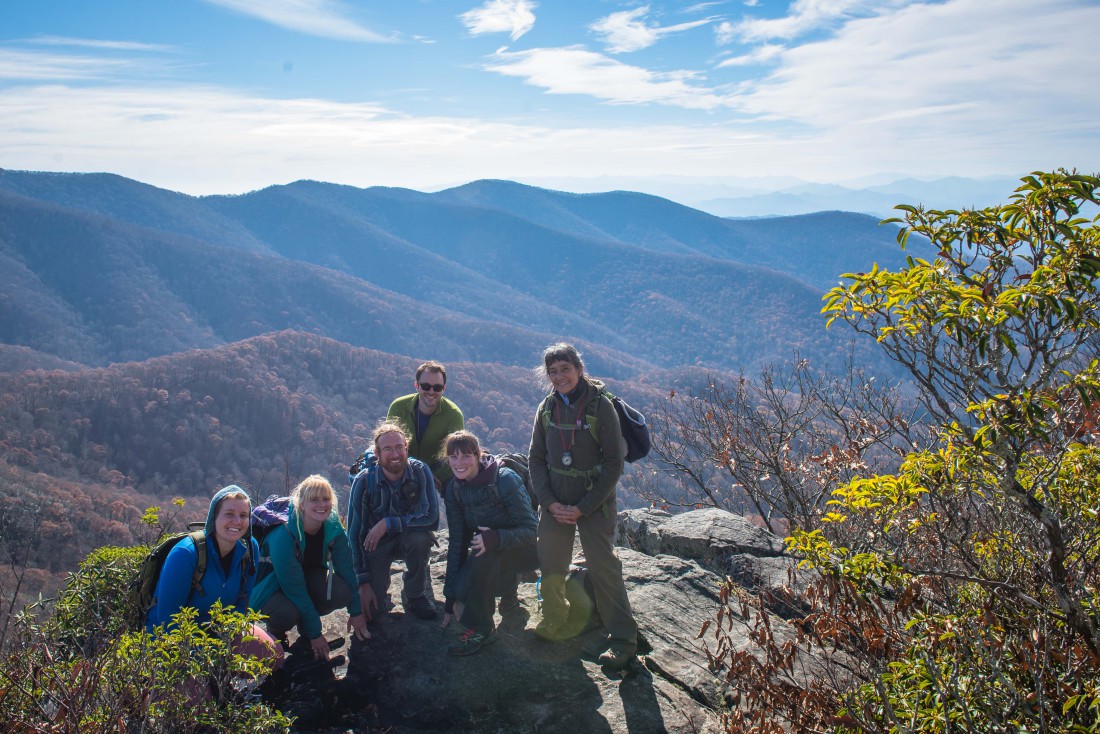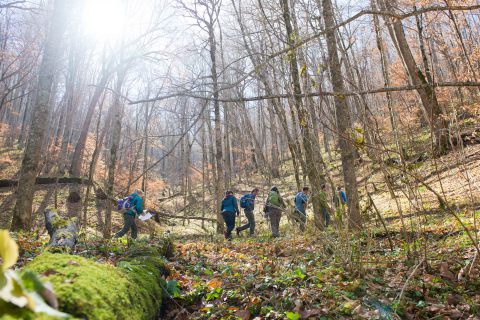On a brisk November morning, with promises of frost whistling in the mountain air, a group of eight people circle beside a dirt-and-gravel way just north of Barnardsville. Hawkbill Creek crinkles a quiescent rhythm — its current massaging the corners of stolid gray rocks, winding the detritus of fallen brown leaves, slipping the shocks of grass-green islands — and burbles a background melody.
Anticipation abounds, among the trekkers at least, as they introduce themselves and ponder the day’s potential. Gathered on an unpaved road, beside a never-bridged brook, in a forest that’s never been logged, the group itches to begin — to explore and experience, assist and learn, and join with the world outside. These are the Forest Keepers, and the wild slopes of wooded places are their workspace.
The day’s expedition is led by AmeriCorps Forest Keeper Alexandra Guest and Public Lands Biologist Josh Kelly — both of whom work with MountainTrue (the new environmental organization formed by the merger of three groups — the Western North Carolina Alliance; the Environmental and Conservation Organization; and the Jackson-Macon Conservation Alliance). The nonprofit has hosted a smattering of Forest Keeper events since 2012, but Guest’s arrival in 2014 has helped the program come into its own. Its goal, say Guest and to Kelly, is to help fill the gap between the abundance of public lands in Western North Carolina and the dearth of funds allotted to the agencies charged with managing those lands — agencies such as the U.S. Forest Service.
“There are more than one million acres of public land in WNC, but there are not enough resources to care for those lands as they need to be cared for. So the Forest Keepers’ role is to increase the capacity of [MountainTrue] and all of our … partners,” says Kelly. He continues, “We want to see the gaps filled in — trails better maintained, invasive plant species reduced and struggling wildlife populations supported.”
Guest talks about the evolution of the Forest Keepers and scheduling monthly excursions. “We’re looking for events in different scopes,” she says. “This wilderness study program is for you, and I’d love to hear your ideas.”
The agenda for the day emphasizes off-trail navigation and winter tree identification —with a bit of trail maintenance to be performed along the way. The ultimate goal of the Forest Keepers program, however, is to reconnect people with nature. “The long-range mission for the program is to give people the knowledge and skills they need to get outside,” says Kelly.
Beyond the reward of simply communing with the natural world, Kelly explains why the ability to find your way without a trail can be so important. “Most of the land here is off-trail,” he says. “If you can get off of the trail and navigate that way, you’re going to be incredibly valuable to the Forest Service.” (Hikers not on such a mission, however, are encouraged to stay on the trails, to reduce their chances of getting lost and to protect pristine and rare habitats.)
The Forest Service could use the help. The agency is updating its plans for the Pisgah and the Nantahala National Forests. When finalized later in 2015, the planning document will determine how these lands are to be managed for the next 15 years. These two forests comprise more than 1 million acres, and they annually host ever-increasing numbers of visitors from around the country (and the world).
Since 2013, the Forest Service has initiated a stream of public meetings, planning sessions, inventory and resource evaluations and proposed actions. The problem is that whichever strategy the Forest Service decides to follow, some group (possible many groups) is going to be unhappy.
While any number of issues can be seen as sources of contention, the Forest Service’s multiple-use mandate dominates much of the debate. The Land Revision Act of 1891 established the National Forest system, but the Multiple Use and Sustained Yield Act — passed in 1960 — dictates that national forests provide recreation, range, timber, watersheds and wildlife and fish habitats. Mining has also come into play.
A fall 2014 panel discussion hosted by Asheville-based online media nonprofit Carolina Public Press highlighted the tension between wildlife-habitat proponents and wilderness advocates. “There is a whole spectrum of areas we feel deserve better protection, and the planning process should consider that,” said Hugh Irwin of The Wilderness Society. He called the current Forest Plan of being “extreme” and “unbalanced.”
Gordon Warburton, Mountain Ecoregion Supervisor for the North Carolina Wildlife Resources Commission, on the other hand, argued that the Pisgah and the Nantahala National Forests need to have more habitats for wildlife species — a process that could involve “opening up” old-growth sections of the forest.
Kevin Colburn, National Stewardship Director for American Whitewater, angled for protecting both water quality and riverine recreation.
The list goes on, but the bottom line is that the Forest Service is being pulled in any number of directions at once — hence the value of the Forest Keepers. “The Forest Keepers are there to help us care for the forest — and not only us, but all of the land management agencies around WNC,” says Kelly.
So for the Forest Keeper excursion, the agenda focused on moving from point A to point B without a path to follow — freestyle hiking. Exploring the forest this way can help the federal agency catalog invasive species, locate misused areas of the forest and generally give it some much-needed eyes and ears.
At the journey’s start, Guest and Kelly distributed topographical maps of the area — complete with black triangles indicating waypoints not linked by trails. Compasses, and a bit of advice on how to use them, were also passed around. The day’s itinerary consisted of an uphill hike to Snowball Gap, a break for lunch and an off-trail return to the parking area before the sun set. On paper, the plan seemed simple enough.
Looking at a series of waypoints on a map, however, and then trying actually to cross those waypoints, is no mean feat. And even though Guest promises, “We Forest Keepers don’t race,” the hike is a challenge.
The day, however, is perfect for the occasion. Each member of the team takes a turn at leading the expedition, and Guest and Kelly point out both common and uncommon tree species as they go. From cedar glades to hemlock stands, from white pines to stolid oaks, from buckeyes to white ashes to red maples to sugar maples, this swath of forest offers a remarkable diversity of plant life. “This is one of the crown jewels of wild land in WNC,” Kelly posits.
After struggling uphill to Snowball Gap and breaking for lunch, the Forest Keepers made one last incline push to Hawkbill Rock — a majestic overlook and a fitting pinnacle for the day’s activities. “This is one of the most bio-diverse areas in the world,” Kelly says. “But 80 percent of this area is open for timber production, and this is one of the areas we want to see protected in the Forest Plan. There are so many areas that could benefit from forest management, but this isn’t one of them.”
The uphill portion of the trek now complete, the second half promises to be a downward jaunt. As it turns out, however, hiking down can be even more difficult than hiking up. The remainder of the adventure was completed almost entirely without the aid of a trail, and boulder fields, knee-deep leaf patches and half-covered, ankle-biting nooks and crannies make the going anything but easy. Nevertheless, the terrain’s uncarved splendor was rustic, remarkable and rare. “This is one of the most natural sections of the National Forest,” Kelly explains. “There are only 2,000 acres of virgin forest left, and we’re hiking through some of it now.”
At long last, as the sun’s rays begin to wane, the Forest Keepers returned to the trail on which they began. A group that started the day as mostly strangers had settled, it would seem, into a sharper-eyed and better-prepared troupe of amiable companions. As they regrouped into a circle beside the creek from which they launched their enterprise, an easier bond, and a deeper appreciation for the forests that serve such a plentitude of needs for so many of WNC’s residents, predominates.
As Kelly remarked at the onset, “I always learn something from people on every hike I take.” For this group, on this day, that statement holds true — not just for Kelly, but for every one of these forests’ keepers.
On Saturday, Jan. 24, the Forest Keepers will be building bat boxes to give to the NC Wildlife Resources Commission — with hopes of posting them on public land in the spring. The trees in younger forests tend to lack ideal hiding spots, but bat boxes provide roosting and nursery habitat space, Guest explains.
On Tuesday, Feb. 21, the Forest Keepers will partner with the Southern Appalachian Highlands Conservancy for a Leave No Trace Awareness Workshop that will focus on teaching people about how to reduce their impact when camping and hiking. This workshop is slated to have an indoor presentation and discussion session in the morning followed by an afternoon putting those skills to use.
Hiking locations will be announced later. Transportation will be provided. Both events will run from around 10 a.m. to 4 p.m. More details are to follow.
Alexandra Guest can be reached at alexandra@wnca.org. Josh Kelly can be contacted at josh@wnca.org. WNCA’s website can be found at www.wnca.org. However, the organization’s name will change to MountainTrue as of January 1, 2015.





American Whitewater needs to stop advocating for expansion into remote areas…as a boater, I can tell you the damage/litter/destruction boaters cause…just look at ANY stretch of the Chattooga and you will see huge impacts, as the boating community swells to include people w/little to no respect for wildlife/wild spaces…dogs run free and harass wildlife…while “energy goo”/powerbar wrappers litter the put ins…American Whitewater should be looking to STOP access to areas that have been over impacted by boaters!